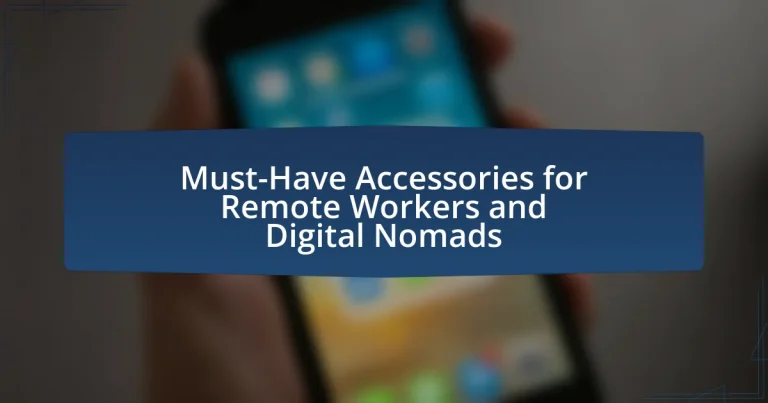The article focuses on essential accessories for remote workers and digital nomads, highlighting items that enhance productivity, comfort, and connectivity. Key accessories include a reliable laptop, portable charger, noise-canceling headphones, ergonomic laptop stand, and high-quality webcam. The article discusses the importance of ergonomic design in reducing physical strain, the role of technology in facilitating effective communication, and the significance of portability for those working in various locations. Additionally, it emphasizes best practices for selecting accessories, budget considerations, and common mistakes to avoid, ultimately aiming to improve the remote work experience.

What are the Must-Have Accessories for Remote Workers and Digital Nomads?
The must-have accessories for remote workers and digital nomads include a reliable laptop, portable charger, noise-canceling headphones, ergonomic laptop stand, and a high-quality webcam. A reliable laptop is essential for productivity, as it enables access to necessary software and communication tools. Portable chargers ensure that devices remain powered during travel, which is crucial for maintaining connectivity. Noise-canceling headphones enhance focus by minimizing distractions in various environments. An ergonomic laptop stand promotes better posture and comfort during long working hours, while a high-quality webcam is vital for clear video communication in virtual meetings. These accessories collectively enhance efficiency and comfort for remote work and travel.
Why are accessories important for remote work and digital nomad lifestyles?
Accessories are important for remote work and digital nomad lifestyles because they enhance productivity, comfort, and connectivity. Essential accessories such as ergonomic keyboards, portable monitors, and noise-canceling headphones facilitate efficient work environments, allowing individuals to maintain focus and reduce physical strain. For instance, studies show that ergonomic tools can decrease the risk of repetitive strain injuries by up to 50%, thereby improving overall work performance. Additionally, accessories like portable chargers and travel-friendly Wi-Fi hotspots ensure reliable connectivity, which is crucial for remote work success. These tools collectively support a flexible and efficient work setup, enabling digital nomads to work effectively from various locations.
How do the right accessories enhance productivity for remote workers?
The right accessories enhance productivity for remote workers by providing essential tools that improve efficiency and comfort. For instance, ergonomic keyboards and mice reduce strain during long hours of work, leading to better focus and less fatigue. Additionally, high-quality webcams and microphones facilitate clear communication during virtual meetings, which is crucial for collaboration. Research indicates that using dual monitors can increase productivity by up to 30%, as they allow for more efficient multitasking. Therefore, investing in the right accessories directly correlates with improved work performance and overall productivity for remote workers.
What role do accessories play in maintaining comfort while working remotely?
Accessories play a crucial role in maintaining comfort while working remotely by enhancing ergonomics and personalizing the workspace. Ergonomic accessories, such as adjustable chairs, standing desks, and keyboard supports, help reduce physical strain and promote better posture, which is essential for long hours of work. For instance, a study published in the Journal of Occupational Health Psychology found that ergonomic interventions can significantly decrease discomfort and increase productivity among remote workers. Additionally, personal items like noise-canceling headphones and desk organizers contribute to a more focused and organized environment, further supporting comfort and efficiency.
What types of accessories should remote workers consider?
Remote workers should consider accessories such as ergonomic chairs, adjustable desks, high-quality webcams, noise-canceling headphones, and reliable external monitors. Ergonomic chairs and adjustable desks promote better posture and comfort during long working hours, which is essential for productivity. High-quality webcams enhance video conferencing experiences, while noise-canceling headphones help minimize distractions in home environments. Reliable external monitors increase screen real estate, allowing for more efficient multitasking. These accessories are supported by studies indicating that ergonomic setups can reduce discomfort and improve focus, ultimately leading to higher work efficiency.
Which tech gadgets are essential for effective remote work?
Essential tech gadgets for effective remote work include a reliable laptop, high-quality webcam, noise-canceling headphones, and a stable internet connection. A reliable laptop is crucial as it serves as the primary tool for tasks such as video conferencing, document editing, and project management. High-quality webcams enhance video calls, ensuring clear communication, which is vital for collaboration. Noise-canceling headphones improve focus by minimizing distractions in various environments, allowing for better productivity. Lastly, a stable internet connection is fundamental, as it supports seamless communication and access to cloud-based tools, which are essential for remote work efficiency.
What ergonomic accessories can improve health and comfort?
Ergonomic accessories that can improve health and comfort include adjustable standing desks, ergonomic chairs, keyboard and mouse wrist supports, and monitor stands. Adjustable standing desks allow users to alternate between sitting and standing, which can reduce the risk of musculoskeletal disorders and improve circulation. Ergonomic chairs provide lumbar support and promote proper posture, which can alleviate back pain. Wrist supports for keyboards and mice help maintain neutral wrist positions, reducing strain during prolonged use. Monitor stands elevate screens to eye level, minimizing neck strain. Research indicates that proper ergonomic setups can lead to a 25% reduction in discomfort and a 10% increase in productivity among remote workers.
How can accessories improve the digital nomad experience?
Accessories can significantly enhance the digital nomad experience by providing essential tools for productivity, comfort, and connectivity. For instance, portable chargers ensure that devices remain powered during travel, while noise-canceling headphones facilitate focus in various environments. Additionally, ergonomic laptop stands and portable keyboards improve posture and typing efficiency, which is crucial for long working hours. Research indicates that using ergonomic accessories can reduce discomfort and increase productivity by up to 20%. Furthermore, accessories like travel organizers and compact bags streamline packing and accessibility, making transitions between locations smoother. Overall, the right accessories not only support the practical needs of digital nomads but also contribute to a more enjoyable and efficient work-life balance.
What portable solutions are available for digital nomads?
Portable solutions available for digital nomads include lightweight laptops, portable Wi-Fi hotspots, noise-canceling headphones, and compact power banks. Lightweight laptops, such as the MacBook Air or Dell XPS 13, offer high performance in a portable form, making them ideal for work on the go. Portable Wi-Fi hotspots, like the Skyroam Solis, provide reliable internet access in various locations, essential for remote work. Noise-canceling headphones, such as the Bose QuietComfort series, enhance focus by minimizing distractions in busy environments. Compact power banks, like the Anker PowerCore, ensure devices remain charged during travel, supporting uninterrupted productivity. These solutions collectively enhance the flexibility and efficiency of digital nomads in diverse work settings.
How do accessories facilitate connectivity and communication on the go?
Accessories facilitate connectivity and communication on the go by providing essential tools that enhance mobile device functionality. For instance, portable chargers ensure that devices remain powered during travel, enabling continuous access to communication apps and services. Additionally, wireless earbuds and headsets improve audio quality for calls and video conferences, allowing for clearer conversations in various environments. Furthermore, mobile hotspots enable internet access in areas without Wi-Fi, ensuring that remote workers can stay connected regardless of location. These accessories collectively support seamless communication and connectivity, which are crucial for remote workers and digital nomads.
What are the key features to look for in remote work accessories?
Key features to look for in remote work accessories include ergonomic design, portability, connectivity options, and durability. Ergonomic design ensures comfort during long hours of use, reducing the risk of strain or injury; for example, ergonomic chairs and keyboards can significantly enhance posture and reduce discomfort. Portability is essential for remote workers who may need to move between locations; lightweight and compact accessories, such as foldable laptop stands and wireless mice, facilitate easy transport. Connectivity options, including multiple USB ports and compatibility with various devices, enhance productivity by allowing seamless integration with different technologies. Lastly, durability is crucial; accessories made from high-quality materials withstand daily wear and tear, ensuring longevity and reliability in a remote work environment.
How does portability impact the choice of accessories for remote workers?
Portability significantly influences the choice of accessories for remote workers by prioritizing lightweight, compact, and multifunctional items. Remote workers often require accessories that can easily fit into bags or be used in various locations, such as coffee shops or co-working spaces. For instance, portable laptop stands, compact keyboards, and foldable monitors are preferred because they enhance ergonomics while being easy to transport. According to a survey by Buffer in 2023, 58% of remote workers reported that the ability to work from different locations was a key factor in their productivity, highlighting the importance of portable accessories in facilitating this flexibility.
What should be considered regarding durability and reliability in accessories?
Durability and reliability in accessories for remote workers and digital nomads should prioritize material quality, design robustness, and user reviews. High-quality materials, such as reinforced plastics or metals, enhance the lifespan of accessories, while robust design minimizes wear and tear from frequent travel. User reviews provide insights into real-world performance, indicating how well accessories withstand daily use and environmental factors. For instance, accessories like laptop bags made from water-resistant materials can protect devices from spills and rain, ensuring reliability in various conditions.
What are the best practices for selecting accessories as a remote worker?
The best practices for selecting accessories as a remote worker include prioritizing ergonomic design, ensuring compatibility with existing technology, and considering portability. Ergonomic accessories, such as chairs and keyboards, enhance comfort and reduce strain during long working hours, which is crucial for productivity. Compatibility with devices ensures seamless integration, preventing technical issues that can disrupt workflow. Portability is essential for remote workers who may travel; lightweight and compact accessories facilitate easy transport. According to a study by the Human Factors and Ergonomics Society, ergonomic workspaces can increase productivity by up to 25%, underscoring the importance of selecting the right accessories.
How can remote workers prioritize their accessory needs based on their work style?
Remote workers can prioritize their accessory needs based on their work style by assessing their specific tasks and environment to determine which tools enhance productivity and comfort. For instance, a remote worker who frequently engages in video conferencing may prioritize a high-quality webcam and noise-canceling headphones, while someone focused on writing or coding might invest in an ergonomic keyboard and a comfortable chair. Research indicates that ergonomic accessories can reduce discomfort and increase productivity, with a study by the Occupational Safety and Health Administration showing that proper ergonomic setups can lead to a 25% increase in efficiency. By aligning accessory choices with their work style, remote workers can create a tailored workspace that maximizes their effectiveness and well-being.
What budget considerations should be made when purchasing accessories?
When purchasing accessories, budget considerations include the total cost, quality, and potential long-term savings. The total cost encompasses not only the purchase price but also any additional expenses such as shipping, taxes, and potential maintenance. Quality is crucial, as investing in higher-quality accessories can lead to durability and better performance, ultimately saving money over time. For example, a high-quality laptop stand may have a higher upfront cost but can prevent health issues and improve productivity, leading to greater efficiency and reduced medical expenses. Additionally, consider the frequency of use; accessories that will be used daily warrant a larger investment compared to those used occasionally.
What common mistakes should remote workers avoid when choosing accessories?
Remote workers should avoid choosing accessories that are not ergonomically designed, as poor ergonomics can lead to health issues such as back pain and repetitive strain injuries. Many remote workers overlook the importance of adjustable chairs and desks, which are crucial for maintaining proper posture during long hours of work. Additionally, selecting accessories based solely on aesthetics rather than functionality can hinder productivity; for instance, a visually appealing but uncomfortable keyboard may reduce typing efficiency. Furthermore, failing to consider compatibility with existing technology can lead to frustration; for example, choosing a headset that does not connect easily to devices can disrupt workflow. Lastly, neglecting to invest in quality accessories can result in frequent replacements, ultimately increasing costs over time.
How can overcomplicating accessory choices hinder productivity?
Overcomplicating accessory choices can hinder productivity by causing decision fatigue and wasting time on unnecessary deliberation. When remote workers and digital nomads face an overwhelming number of options, they may struggle to make quick decisions, leading to delays in their workflow. Research indicates that having too many choices can lead to decreased satisfaction and increased anxiety, which ultimately detracts from focus and efficiency. For instance, a study published in the Journal of Consumer Research found that individuals presented with fewer options were more likely to make a decision and feel satisfied with it, highlighting the negative impact of excessive complexity on productivity.
What are the risks of neglecting ergonomic considerations in accessory selection?
Neglecting ergonomic considerations in accessory selection can lead to significant health risks, including musculoskeletal disorders, chronic pain, and decreased productivity. Research indicates that improper ergonomic setups can result in conditions such as carpal tunnel syndrome and lower back pain, affecting up to 60% of remote workers. Additionally, poor ergonomics can lead to fatigue and reduced focus, ultimately impacting work efficiency. Therefore, prioritizing ergonomic accessories is essential for maintaining health and productivity in remote work environments.
What tips can enhance the effectiveness of accessories for remote workers?
To enhance the effectiveness of accessories for remote workers, prioritize ergonomic design, ensuring comfort during long hours of use. Ergonomic accessories, such as chairs and keyboards, reduce strain and improve posture, which can lead to increased productivity. Additionally, invest in high-quality audio and video equipment for clear communication during virtual meetings; studies show that poor audio quality can lead to misunderstandings and decreased collaboration. Furthermore, utilize organizational tools like cable management systems and docking stations to maintain a tidy workspace, which can minimize distractions and enhance focus. Lastly, consider portable accessories, such as lightweight laptop stands and travel-friendly chargers, to facilitate a flexible work environment, allowing remote workers to maintain productivity in various locations.





